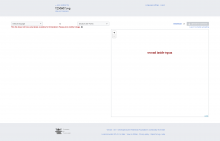As a SVG Translate user, I want to access labels, so that I can properly use the tool for translation.
Background: The user is experiencing the following issue: "This file does not have any labels available for translation. Please pick another image."
Resources:
Steps to Reproduce:
https://tools.wmflabs.org/svgtranslate/File:T250607.svg
Actual Results:
Expected Results:
Give an error message for not supporting nested tspans
Acceptance Criteria:
- Fix label bug so that users can properly access label functionality and complete translation work in SVG Translate

